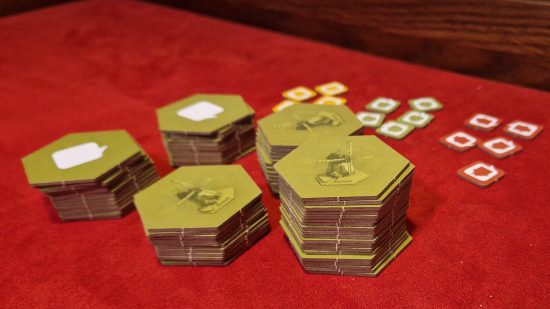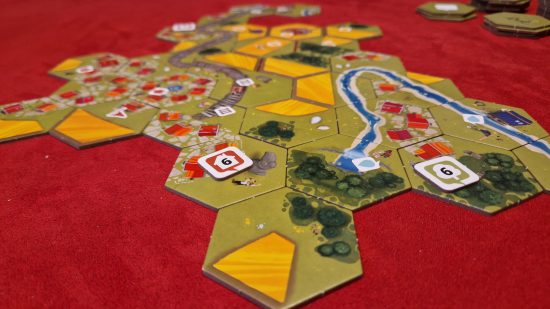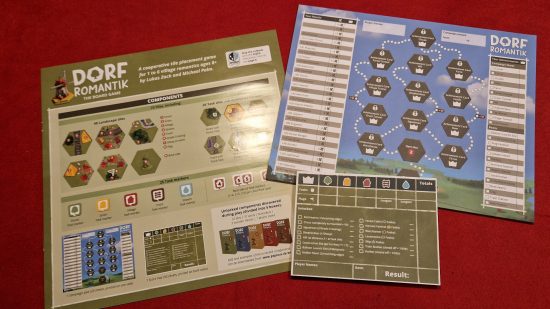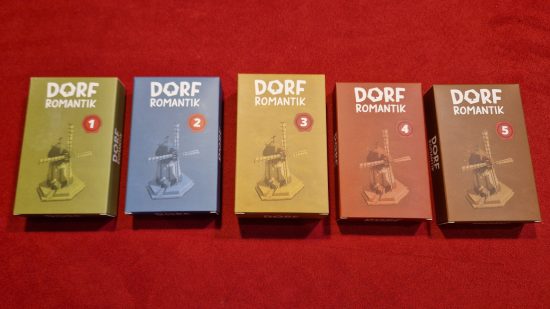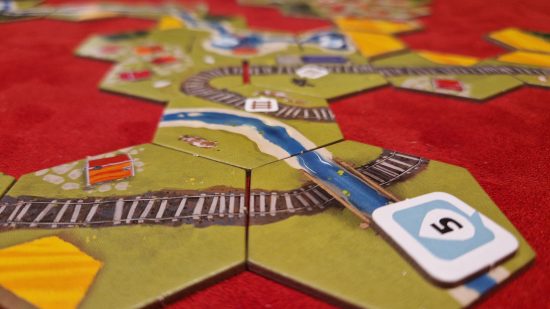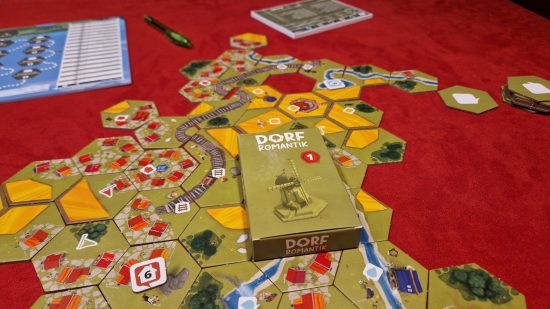The Dorformantik board game – adapted from the popular PC puzzle game from 2021 – is strikingly simple, a plum example of the tabletop world aping videogames’ beloved ‘cosy game’ genre, and winner of the 2023 Spiel des Jahres award. But it’s so straightforward, so free of any real way to ‘lose’, that some critics say it isn’t really a game at all. I think that’s too harsh, but it’s not entirely wrong either – let me explain in this review.
Dorfromantik certainly lives up to its name. The German title translates best as ‘the romantic notion of idyllic village life’ – which the PC game recreates by having you gradually build your own cute little rural town out of meadows, forests, buildings, streams, and railways. If we had a guide to the ‘best board games to evoke nostalgia for a blissful, bucolic, pre-modern existence that never truly existed’, this would come top.
There are no dangers or antagonists except the challenge of drawing random tiles from a central supply, and trying to place sets of matching tiles together – thereby earning points and combos – while avoiding painting yourself into a corner with poor placements.
As you advance further, more tile types are added, that allow for more combos and higher scores, but also widen the decision space a bit, meaning more mistakes are possible – but the cost is never high enough to raise the heart rate.
The board game – which Pegasus kindly provided Wargamer free for review – is exactly the same. You get two stacks of hexagonal tiles: landscape tiles, which have different combinations and patterns of terrain types across their six edges; and task tiles, which are the same, but also grant points for creating an area of matching terrain linked to them.
Each turn, you place one down – a task tile, if there aren’t currently three tasks open, or a landscape tile if there are. Railways and rivers have to be placed to link with another of their kind, and you’ll get bonus points at the end depending on how long you can make them.
A couple of tiles have a colored flag on that’ll give you an extra bonus if they’re completely enclosed by other tiles at the end of the game (which happens when you run out of fresh landscape tiles). Count up all your points, mark down your score, the end.
Except it’s not the end, because Dorfromantik, like its PC predecessor, has more up its sleeve. This is, in fact, something of a legacy board game. Inside the box comes not just a scoring pad for totting up individual games, but a second pad of campaign tracking maps, and six mysterious, numbered tuckboxes.
After each game, you’re assigned a ‘rank’ based on your total score; the higher your rank, the more steps you get to colour in on the campaign chart, and at certain intervals you’ll get to open a box, adding the contents to your game permanently.
The goodies unlocked include – among other things – special ‘achievement’ challenge cards and various new types of tile to add to the game supply, all of which unlock and incentivise new and different strategies for successive games, building up your point-scoring potential.
Over several games, this snowballs: score more points, level up more, get more tiles to use and missions to complete, score more points, and so on. It’s a simple progression that layers in additional gameplay options to stave off boredom, while also keeping the stakes low and the scope narrow, by encouraging you to focus on only a few of them each time you play.
I haven’t played through a full campaign due to time constraints; it takes a lot of games – but I’ve opened enough boxes to appreciate the carefully paced and balanced experience designers Michael Palm and Lukas Zach have put together here, even if it’s not strongly to my own taste. It’s no great surprise this game won the prestigious Spiel des Jahres prize for 2023.
By carefully controlling over how much strategic depth is in play at any one time, Dorfromantik manages to keep feeding you interesting new gameplay options without ever poisoning its cozy, toyish, no-pressure vibe.
I don’t generally jive with puzzle board games (give me a good story or sprawling strategy battle any day) and I wasn’t expecting to like this one – but I’ll be damned if my cold, dead heart didn’t grow three sizes as I pieced together my weird, janky maps out of dinky little houses, rushing rivers, sun-drenched wheat fields, and old-timey railroads.
Let’s be clear: if you come to Dorfromantik looking for a ‘city-builder’, or any clever engine-building or management gameplay, you’ll be disappointed. It obviously won’t offer the competitive edge of a war board game, or the mechanical heft of even entry level strategy board games like Catan.
But if you fancy a nice, simple, low-stakes puzzler, with a liberatingly small decision space, gorgeous aesthetics, and enough extra content to keep you and your family hooked for ages, this is an excellent pick.
Simple, cozy, moreish puzzle fun
An accessible, charming, surprisingly rich co-op puzzle game with a zero stress guarantee.
Source: Wargamer



